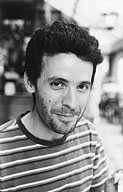Intertwining religion and philosophy
Intertwining religion and philosophy McGill University
User Tools (skip):
Intertwining religion and philosophy
A new interdisciplinary undergraduate program titled "Philosophy and Western Religions" (PHWR) will be launched in September 2004. It will allow students to explore the long history of the interaction between Greek philosophy and the three Abrahamic religions, Judaism, Christianity and Islam.

Professor Carlos Fraenkel
Mary Fowles
"The encounter of these traditions has shaped some of the basic patterns of the intellectual history shared by the Muslim world and the West," said Professor Carlos Fraenkel, 32, chair of the new program and driving force behind its creation. "Islamic and Western civilization have a number of cornerstones in common and one purpose of the program is to bring to light the wide range of intellectual links between the three religions."
The interdisciplinary program, which spans antiquity to the Enlightenment — a period in which philosophy and religion were inseparably interwoven —draws from the Department of Philosophy, the Institute of Islamic Studies, the Department of Jewish Studies and the Faculty of Religious Studies.
Professor Torrance Kirby, who teaches Christian thought in the Faculty of Religious Studies, has had significant input in shaping the program. "To begin to understand this shared tradition will bring together both professors and students from different units at McGill who, until recently, had only very scant occasion to engage with one another," said Kirby. "I cannot help but be convinced this is a step laden with significance beyond the mere establishment of one more academic option for McGill undergraduates." Fraenkel and Kirby, along with Professors Stephen Menn (Department of Philosophy) and Eric Ormsby (Institute of Islamic Studies) form the program's executive committee, which will be responsible for its day-to-day management.
"The interdisciplinary approach will allow students to step outside the linguistic, cultural, religious and geographic divides of existing undergraduate programs," said Fraenkel, who grew up in Germany and Brazil, studied in Berlin, Paris and Jerusalem and now holds a joint appointment in the Departments of Jewish Studies and Philosophy. "Students can therefore gain a more coherent understanding of Western intellectual history."
For example, students will have the opportunity to pursue the development of a philosophical or religious concept from its origin through the different historical and geographical contexts in which it was received by Jewish, Christian and Muslim thinkers.
Erik Dreff, a 20-year-old second-year student, will switch from Jewish Studies into PHWR in September to pursue it as a joint honours with philosophy. "The program is extremely diverse and one-of-a-kind," said Dreff, who plans to eventually do graduate work in ancient or medieval philosophy. "After looking at the courses as well as the prospective instructors, I was convinced. It will teach me what I'm looking for under the Jewish scope but it will also give me a point of reference toward the other two Western religions, which for a career in philosophy is extremely helpful. With the need to focus on one field, having a program as diverse as this one is a dream for an undergrad," said Dreff, adding that the uniqueness of PHWR could be an advantage when the time comes to apply to graduate school.
Yet the program is of more than purely academic importance, Fraenkel said.
"In the current political situation dominated by stereotypes and the simplistic opposition of Islam and the West, and Arabs and Jews, examining in depth the multiple points of contact between Jewish, Christian and Islamic thought can only be beneficial.
"I think it may have a salutary effect on Jews to know that many important developments of Jewish thought were in one way or another expressions of intellectual trends in the Muslim world," said Fraenkel. "It may have an equally salutary effect on Muslims to know that Jews were among the most interesting representatives of the intellectual traditions that developed in the Muslim world from the ninth century onward. It will also not hurt Christians to see how much of their intellectual history was shaped through the adoption of or critical response to the works of Jewish and Muslim philosophers.
"The long-standing and substantial commonality of discourse shared by the three religious traditions ought, in itself, to constitute a justification of relevance [to the present day]," said Kirby.
Fraenkel said the program gets to the very heart of how we understand ourselves.
"While neither Greek philosophy nor the three Abrahamic religions are in themselves homogeneous, we can broadly speak of two very different ways of describing the divine, the world, human nature, the purpose of human life and of validating these descriptions. The encounter of the two traditions produced a wide range of configurations that remain to this day among the fundamental frames of reference for the choices we make, and for our intellectual and moral intuitions," he added.
One feature of the program is the importance given to the acquisition of languages, such as Greek, Latin, Arabic and Hebrew. This provides students, who can choose to pursue a minor, major, honours or joint honours option, with the skills to work with texts in their original languages.
"I hope that in the future we will be able to complement the undergraduate program through a joint PhD program, and in general make McGill into an international scholarly center for research in this field," Fraenkel said.
For more information, refer to the program's website: www.mcgill.ca/phwr, or contact Ines Scharnweber, the program's administrator, at 398-4804.
